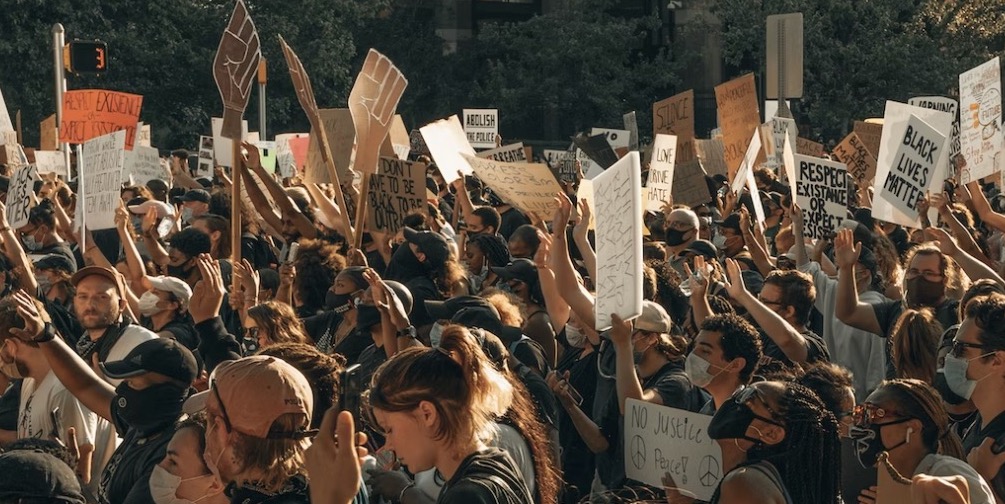


The following article is an adaptation of Dr. Voddie Baucham’s talk, “Biblical Justice vs. Social Justice,” given in January 2021 at Coral Ridge Presbyterian Church. The content has been selectively edited for ease of reading.
One of my all-time, favorite movie characters is Inigo Montoya. If you don’t know who he is, you might need to reevaluate your faith and watch The Princess Bride. Inigo Montoya has this famous line, “You keep on using that word. I do not think it means what you think it means.” For many Christians, that’s true when it comes to the idea of social justice. We keep on using that word, but I don’t think it means what we think it means. Most people who use it mean well, but we need to understand that the term “social justice” has a very specific and well-defined meaning…
Why does the meaning of this matter? It matters because God demands justice. It matters because injustice is sin. And if social justice is truly justice, then anything that does not align with it is sin. Therefore, the term is incredibly problematic, and this is why so many of us fall prey to it because we know that God demands justice.
He has told you, O man, what is good; and what does the Lord require of you but to do justice, and to love kindness, and to walk humbly with your God?
(Micah 6:1-8; emphasis added)
God demands justice from his people. This is why, as people use this social justice terminology, we must understand what it means.
The Oxford English Dictionary says that social justice is a noun related to politics and philosophy: “Justice at the level of a society or state as regards the possession of wealth, commodities, opportunities and privileges.” And it says, “see distributive justice.” Social justice is distributive justice. That’s what social justice means.
William Young writes, “While often an amorphous term, ‘social justice’ has evolved to generally mean state redistribution of advantages and resources to disadvantaged groups, to satisfy their rights and social and economic equality.” Social justice is state redistribution… It is not a heart issue.
From a biblical perspective, justice is a heart issue and a law of God issue. If the law of God says “this,” and you do “that,” it is unjust. If the law of God says “this,” and your heart goes toward “that,” it is unjust. Social justice, by definition, is not a heart issue; it’s a state issue. It is about the state redistribution of advantages and resources to disadvantaged groups. This is another critical distinction. Social justice is not about individuals. It is about groups and achieving specific outcomes for groups.
The Mission of God and the Mission of Social Justice
Our mission as Christians is to align ourselves with the law of God. That’s our mission concerning justice—to see to it that things align with “thus saith the Lord.” That is not the mission of social justice. To understand the mission of social justice, you have to understand a couple of concepts. When you know the roots of these concepts that undergird critical theory, critical race theory, and intersectionality, you will discover that social justice is inherently incompatible with biblical justice.
For example, the concepts of critical social justice, critical theory, critical race theory, and intersectionality, these terms are part of a very long line of ideas and ideologies. We go back to Karl Marx and his concept of conflict theory. Conflict theory for Marx was his way of explaining sociology and the relationships between people. Marx argued that the root of relationships between people is a conflict over limited resources. The whole idea of the bourgeois and the proletariat, of the haves and the have-nots, of Marxism versus capitalism is rooted and grounded in conflict theory.
The Frankfurt School developed this idea and gave “critical theory” to the world—the “critical” part of “critical social justice.” Antonio Gramsci, an Italian Marxist, argued that the Marxist vision of proletariat uprisings around the world did not materialize because of a concept he developed called hegemony. Hegemony is the idea that there is a ruling group in a culture and in society, and they establish the rules of the game to benefit themselves and those like them, and to oppress all other groups of individuals.
What does all of that have to do with this idea of social justice? When you interpret America through the Marxist paradigm of oppressor and oppressed, most people would identify rich people or white people as the hegemonic oppressor. That’s part of it. But according to critical social justice, the oppressor class in America is white, male, heterosexual, cisgendered, able-bodied, native-born Christians. Most people have heard of white privilege, and you’ve heard of male privilege. Have you heard of Christian privilege? Christian privilege is also identified as a major source of oppression in Western culture in general and in American culture in particular. Christian privilege is as evil as white privilege. Christianity is the oppressor for social justice theorists.
If social justice is about alleviating oppression and Christianity is identified as a significant source of oppression, social justice has to be opposed to what? Christianity. Social justice must be opposed to Christianity because, in this culture, Christianity is a major (for some, the major) source of oppression.
The Social Justice Boxcar
Most Christians, when they get sucked into the social justice movement, usually think about one area and one area alone: race. We love the brethren as Christians. Racism is ugly to us. It’s evil to us. So, when somebody says there are issues here related to race and justice, we ask “Where? Point me in the right direction and let’s go to war!” And the social justice movement comes, and it sounds innocuous. We jump on board having no idea that the social justice movement is like a train with multiple box cars. There’s an engine driving the train: critical theory and intersectionality. But many boxcars are trailing behind.
What are the main “social justice” issues being identified today? Marysville University lists: Climate justice, racial equity, LGBTQ+ rights, affordable healthcare. Yeshiva University lists, justice, healthcare, refugee crisis, racial justice, income gaps, gun violence, hunger and food insecurity, equity. Here’s the list from Educating for Social Justice: Consumerism, death penalty, education, genocide, homelessness, human trafficking, immigration, intergenerational justice, land grabbing, mental health, natural disasters, racial justice, restorative justice, sexual abuse crisis in the church, terrorism, US elections, water, climate change, hunger, migration, economic justice, inequality, torture, gender equality, interfaith relations, US poverty, war, healthcare, sustainable development, refugees, human rights, liberation theology, global poverty, integral ecology, and racism. The list goes on and on and on.
Are you beginning to notice a pattern? Christians jump on the train because we care about racism, but behind the “racial justice” boxcar is the LGBTQUIA+ boxcar. Right behind that is the climate justice boxcar. Many Christians think they can embrace “social justice” and jump onto the racial justice boxcar but not be attached to all the other box cars. You can’t. Everything is a social justice issue. Why? Because social justice is about redistribution…
The Church’s Response
Milton Friedman, Nobel Prize-winning economist, said, “A society that puts equality, in the sense of equality of outcomes, ahead of freedom will end up with neither equality nor freedom. The use of force to achieve equality will destroy freedom and the force, introduced for good purposes, will end up in the hands of people who use it to promote their own interests.” [1]
Social justice has nothing to do with the heart. It has everything to do with politics and power. It is antithetical to biblical justice in every way imaginable. And here’s what you need to know—the church has a big bullseye on her as the source and root of these inequities.
This is not how we, in the body of Christ, are supposed to function. We are not about gaining political power to force people to do justice. We are about the proclamation of the gospel, recognizing that true justice must and can only come from hearts transformed through the person and work of Jesus Christ. Our greatest political desire is the freedom to proclaim the gospel in the marketplace of ideas. But guess what? Critical social justice will ultimately not tolerate proclaiming the gospel in the marketplace of ideas because it is a source and a means of oppression.
We must pursue justice. Injustice is sin. The primary difference between biblical and social justice is in how to define injustice. The Bible would define injustice as that which fails to comply with, to comport with, and to rise to the level of the law of God. That’s how the Bible would define injustice in my relationship to others, in my relationship to the state, and in my relationship with my family. Injustice comes down to whether or not I was submitting to the law of God in this circumstance. We want justice. But what we mean by that is, “Thy kingdom come, Thy will be done, on earth as it is in heaven.” That’s the justice we want.
[1] Milton Friedman and Rose D. Friedman, Free to Choose: A Personal Statement (New York: Harcourt Brace Jovanovich, 1979)

No spam, stay up to date on new articles, resources and events!
Get notified about new articles from the Institute.